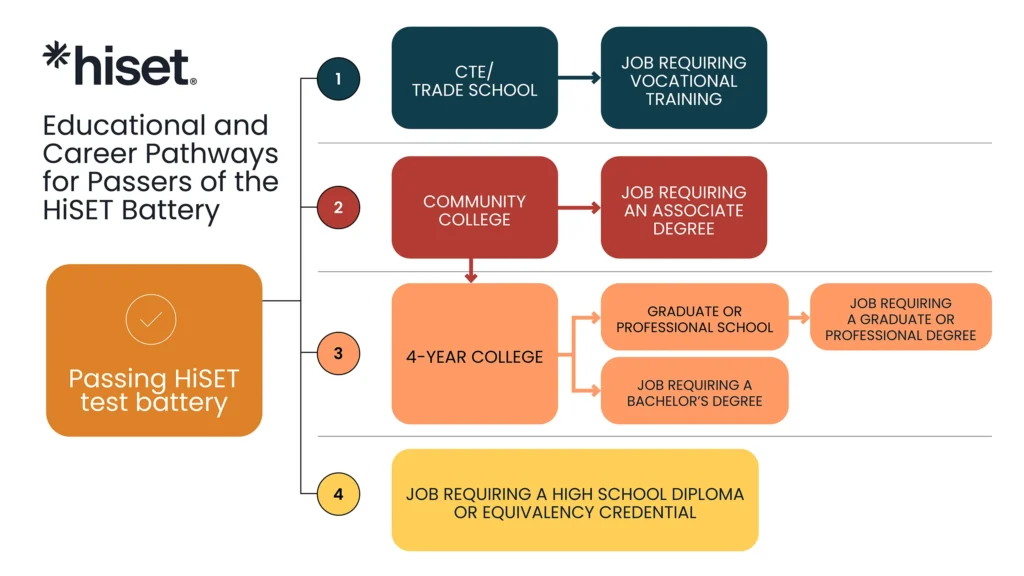Why consider HiSET grads?
Information for businesses, colleges, and organizations. Understand, verify, and accept/hire HSE graduates, strengthening partnerships in education and workforce development.


Why hire or admit HSE and HiSET Graduates?
Applicants with an HSE credential like HiSET bring valuable skills, persistence, and adaptability to the classroom or workplace.
Reliable, motivated, and resilient workforce:
- Determination and grit – HSE graduates have overcome obstacles, demonstrating perseverance and commitment to achieving their goals.
- Strong work ethic and time management skills – Many HSE graduates have juggled work, family, and education, making them adaptable and hardworking employees.
- Workforce development and retention – Investing in HSE graduates fosters loyalty and reduces turnover.
- Lifelong Learners – HSE graduates often seek professional development and further education, making them great long-term employees.
Skilled and job-ready candidates
Foundational knowledge – Adult education and HSE programs focus on essential skills in math, reading, writing, and problem-solving—key competencies for most jobs.
Career and technical training – Many HSE graduates are great candidates to earn industry certifications in fields like healthcare, sales, IT, manufacturing, and skilled trades:
Healthcare-Focused Training
Many HSE graduates complete certifications like Certified Nursing Assistant (CNA), Medical Assistant (MA), Phlebotomy Technician, Patient Care Technician (PCT).
- Math & Reading Skills: HSE programs emphasize reading comprehension, medical math, and communication—critical for healthcare roles.
Carpentry, Electrical, Plumbing, HVAC, Welding, Manufacturing & Quality Control or Heavy Equipment Certifications
The construction and skilled trades industries need a reliable, skilled, and motivated workforce. HSE graduates bring hands-on experience, problem-solving abilities, and a strong work ethic—making them excellent candidates for careers in carpentry, electrical work, plumbing, welding, HVAC, and more.
- Math, Problem-Solving Skills & Blueprint Reading Skills: HSE programs emphasize measurement, algebra, and critical thinking, geometry, and problem-solving — essential for calculations, circuits, and voltage loads, and precision work in electrical trades and manufacturing.
Insurance, Financial Planning & Real Estate
The insurance and real estate industries thrive on strong communication, problem-solving, and customer service skills. HSE graduates bring resilience, adaptability, and a strong work ethic, making them valuable assets in sales, underwriting, claims, property management, and more.
- Math & Analytical Skills: HSE programs emphasize financial literacy, percentages, and critical thinking — key for calculating premiums, commissions, mortgages, and investments.
Information Technology (IT)
The IT industry relies on critical thinking, problem-solving, adaptability, technical skills and persistence — qualities that HSE graduates bring to the workforce. HSE graduates can start as IT support specialists, help desk technicians, or network administrators and advance to cybersecurity analysts, software engineers, or IT managers.
- Logical Thinking & Analytical Skills: HSE programs emphasize math, data analysis, and critical thinking—essential for coding, troubleshooting, and network security.
Positive business and community impact

Stronger local economy
Hiring skilled candidates strengthens communities and expands the talent pipeline.

Workforce incentives and training grants
Employers may qualify for workforce development funding and tax benefits for hiring HSE graduates.

Fill workforce gaps
With a growing demand for healthcare and skilled trades workers, HSE graduates provide a pipeline of trained professionals.

Lower turnover rates
HSE graduates value career stability and professional development, increasing retention.

Career growth potential
HSE graduates can start as apprentices and grow into journeymen, supervisors, or even business owners.
Who needs a HSE credential?
A HSE credential is typically required when applying for a job or a post-secondary academic program at a community, technical or four-year college or institution. A HSE credential may increase wages, and job or academic opportunities. For those who have been incarcerated, earning a HSE credential helps reduce recidivism.
Official HSE credentials are:
Issued by the State
Not the test provider.
A great option
For those who did not complete high school or have arrived in the U.S. without a credential equivalent to a high school diploma.
Accepted alternatives
To high school completion.
Who accepts a HSE credential?
Official HSE credentials include a transcript and an HSE diploma or certificate. These State-issued credentials are accepted by every U.S. state, territory, and jurisdiction, as well as academic institutions, the U.S. Department of Education, the military, and federal programs. An employer may require proof of an HSE credential for a job or a promotion.
Verify HSE Credentials
Find out how to confirm an applicant’s official HSE certification.
HSE and career pathways
Understand how an HSE credential aligns with job readiness, apprenticeships, and industry certifications.

Understanding HiSET scores
Learn how to interpret HiSET test scores and what they mean for the HiSET graduate’s future.
Workforce development programs
Explore partnerships, funding opportunities, and training programs to support HSE graduates entering the workforce. Explore job opportunities and training programs at CareerOneStop.
Interested in partnering with the HiSET Program? Let us know at [email protected].
Resources for recruiters
Understand more about the value of HSE graduates. Download guides on best practices for recruiting and supporting HSE graduates.
Recruiter toolkit:
- Learn about the Benefits of Taking the HiSET/ Hágase cargo de su futuro con el examen HiSET
- Want to know more about the Benefits of Recruiting HiSET Passers? This document is based on outcomes from Validating HiSET® Tests as High School Equivalency Tests That Improve Educational, Vocational, and Quality-of-Life Outcomes.